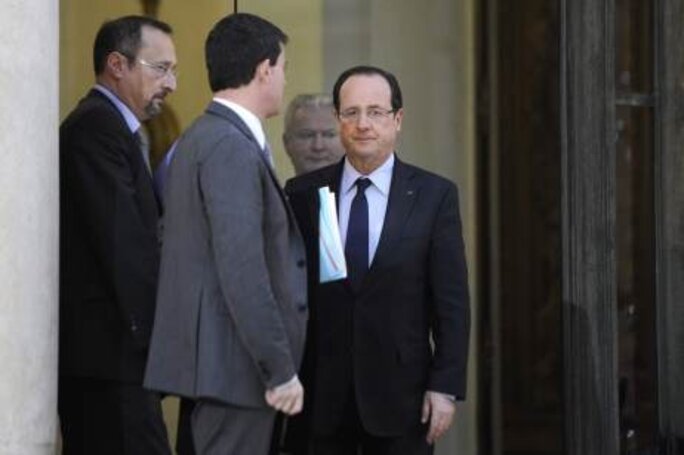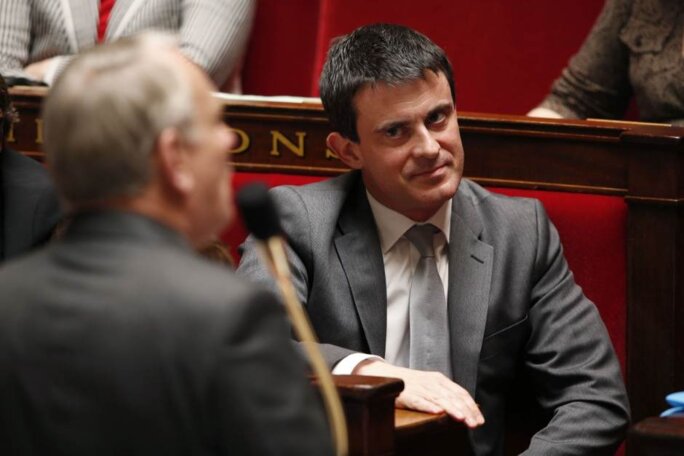“By voting or by abstaining, you have expressed your unhappiness and your deception,” said French President François Hollande in his televised address to the nation on Monday evening, 24 hours after the disastrous results for his socialist party in nationwide local elections. Announcing the appointment of Manuel Valls as France's new prime minister, replacing Jean-Marc Ayrault who had been in the post since Hollande's election in May 2012, the president told the French public: “I have heard your message, it is clear.”
“I haven’t forgotten who put their confidence in me, who elected me, nor why I am in this position of responsibility,” he said. “It is today time to begin a new stage. I have therefore given Manuel Valls the mission of leading the government of France. He has the qualities to do so. It will be a tightened government, coherent and united [...] A government of combat.”
The behind-the-scenes manoeuvring earlier on Monday had been tense, and Ayrault's rumoured replacement by Valls, 51, was appeared still uncertain even for some of those close to the events. “Everything speeded up in five hours,” commented a leading Green party member, who asked not to be named. “We were all taken by surprise, and the socialists seem to have been even more so.”
When Ayrault met with Hollande at the presidential offices, the Elysée Palace, on Monday morning, details of their discussion were kept totally confidential. However, a source close to Ayrault claimed that Hollande did not spell out his fate. “He seemed to be still hesitating,” commented the source.
There was no hesitation or surprise when, during Hollande's televised address, the French president reiterated the fundamental orientation of his political programme, that of supply-side economics as represented in his so-called ‘responsibility pact’, a project of tax breaks and lower welfare charges for businesses in exchange for job creations, announced in January. “It is companies that create jobs,” underlined Hollande on Monday, adding that “the biggest injustice is unemployment”.
While he only gave a passing mention about energy transition, Hollande announced the future introduction of yet another pact, a “solidarity pact”, as a balancing act to the ‘responsibility pact’, but about which he gave few details except for the promise of a lowering of employees’ welfare contributions and tax breaks for households to be introduced by 2017. Speaking about Europe, he revived one of his past mantras that has been little heard over the past ten months, which is the need for a “reorientation” of EU policy.
Following the news of the appointment of Valls, the two EELV Green party members of Hollande’s government since his election in 2012, housing minister Cécile Duflot and the foreign ministry’s secretary of state for development, Pascal Canfin, decided to resign. Duflot had recently made no secret of her intention to leave government if ever Valls was appointed prime minister.
For some months now, a number of ministers have made known their frustrations with Ayrault’s management of affairs and what they perceived as his chronic incapacity to give a clear and motivating political lead to his government. “There has to be someone who has a hold on the government team,” commented recently Marisol Touraine, Ayrault’s health and social affairs minister, in private. “Today, the discussions on major policy directions are held at the Elysée by the president, in a constructive manner. These are meetings where there is a proper political debate. With Ayrault, we have arbitration talks, but only one to one. There is a personality problem.”

Over recent days, and even during the day on Monday, several members of government threatened to leave if Ayrault was kept in his post as prime minister. One of them was industry minister Arnaud Montebourg, who had even prepared a resignation letter just in case Ayrault was maintained. Montebourg, a forceful and ambitious 51 year-old who ran against Hollande in the socialist primaries to designate the party’s 2012 presidential election candidate, has never hidden his disdain for Ayrault, who he complained was too weak.
Montebourg, who championed deglobalisation in the primary battles, has since become close to Manuel Valls, who stands on the Right of the Socialist Party, as has also the figurehead of the party’s Left, Benoît Hamon, Secretary of State for Consumer Affairs. Education minister Vincent Peillon has also made it known that he would prefer to serve Valls rather than Ayrault.
'Government seen as giving up on transforming society'
Relations between the presidency and the prime minister’s office have been extremely tense over recent months, both concerning policy matters and presentation. Several of Hollande’s advisors have been privately lobbying for Ayrault’s departure and for the nomination of Valls. One of them, speaking last month on condition of anonymity, described Valls as representing a political approach that is in line with majority French public opinion. “He is determined in his politics and in his method, and he is complimentary to François Hollande,” he added.

Enlargement : Illustration 3

Aquilino Morelle, Hollande’s key political advisor, describes himself as a friend of Valls, and he was instrumental in the rapprochement between Valls and Montebourg. “They share the same intransigent republicanism, the same economic voluntarism and the same realism regarding European construction,” Morelle told Mediapart early in March.
Meanwhile, members of the prime minister’s office were recently more forthcoming in their criticism of the presidency, and in private Ayrault has on a number of occasions complained about the Elysée’s management style, which of course implies Hollande. On Sunday evening, as the election debacle was played out, Ayrault held a meeting with his inner circle when, according to one of those present, he “let himself go about the president’s governance”.
“He told us that it was difficult to do anything at all with this permanent instability,” said the source, whose name is withheld. “From the beginning, there is a problem with the way things function. Hollande manages things, then lets go, then takes over again.”
Ayrault fought to keep his job right up to the last moment. One of his allies, lobbying for him in private to the press, recently insisted that he was the only one capable of rallying together the very different parties of the Left. “Who other than Jean-Marc Ayrault can reach a balance [of agreement] between all the elements of the ruling majority?” he asked.
When the news of Ayrault’s replacement was made known, one of his friends called it a forced resignation. It was only on Monday afternoon that several government sources leaked the news that Manuel Valls had been chosen to succeed Ayrault. Confirmation was later given to press agency AFP by Valls’s entourage before the prime minister’s office then officially announced the same – and before a formal statement from the Elysée Palace. The letter of collective resignation of the government was brought to the president’s office by one of Ayrault’s advisors.
Valls is, according to opinion surveys, the most popular among the public of any of Ayrault’s ministers and has established a certain credibility among a section of French media commentators. But he has no significant support base within the Socialist Party, neither among its parliamentary group or internally, nor among the electorate of the Left. During the socialist primaries to choose the party’s 2012 presidential election candidate, he garnered just 6% of the vote.
His nomination as prime minister illustrates that the presidency does not believe the results of the local elections were a significant disapproval of Hollande’s policies. Between the two rounds of the elections last week, two quite different analyses of the results circulated in government. One of them, put forward by supporters of Valls, argued that the trouncing suffered by the socialists was due to the inadequate and confusing presentation of the government’s policies, the numerous gaffes made by ministers, and Ayrault’s inability to take a strong political lead, as demonstrated by his lackluster speech after the first-round voting on March 23rd.
The other analysis, that of Ayrault himself, but also the Greens, and the leftist current of the Socialist Party, was that the election debacle reflected a demand for more left-wing and ecological-leaning policies. “Citizens legitimately have the feeling that this government has given up on transforming society, that a political and economic oligarchy runs the country and that the government hasn’t put an end to it,” commented Yannick Jadot, a member of the European Parliament and an influential figure in the EELV green party. “To say that the French have not understood [government policies] is intolerable […] and the symbol that Valls represents is not that of [policies that are] the more social and ecological.”
A number of socialist insiders, notably from the Montebourg and Hamon camps, believe that Valls will offer an olive branch to the leftist current in the makeup of his government and also in his speech of its policy lines when he appears before French parliament late in April for a vote of confidence. While Montebourg appears likely to be offered an enlarged finance ministry, which would include foreign trade, Hamon is likely to be upgraded to a post of minister. Meanwhile, discussions are ongoing to maintain a Green presence in the government.
"The only advantage with Valls is that he doesn’t have an economic line,” said one ministerial advisor who is openly opposed to the former interior minister. “His popularity today is with the Right. That will collapse when he’s prime minister, so he’ll want to gain ground on the Left on economic issues.”
-------------------------
English version by Graham Tearse


